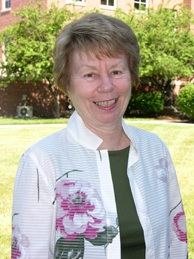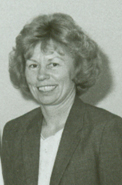 |
 |
Mary Haven retires next month — 38 years after first joining UNMC. |
That’s the way Mary Haven lives her life. Energetic, electric, but thoughtful.
She’s retiring soon as associate dean of UNMC’s School of Allied Health Professions (SAHP) after holding the position for 11 years. Her retirement party is today (June 28) from 1:30 to 4 p.m. in the private dining rooms.
“I’m worried that I won’t be able to stop work long enough to clean out my files,” she said, noting that she’s giving herself one month from her retirement to reverse the consequence of years of accumulation.
“This has been the most exciting time in my life. I’ve worked with wonderful people and the students have been great,” she said. “It’s exciting that the medical center is becoming more nationally known.”
UNMC breaking onto the national scene gives Haven pride because it is a goal she’s worked toward since her appointment by then College of Medicine Dean Harold M. Maurer, M.D.
Her accomplishments are many.
Growing the distance learning programs for medical technology, radiation therapy, physician assistant, cytotechnology, clinical perfusion and radiography tops her list. “These programs have allowed us to become nationally known and have provided us with valuable resources,” she said.
For the risks Haven has taken, she has ingenuity and courage on her side. But, her actions are not compulsive. “I think everything through,” she says.
Offering a degree completion option in the physician assistant program through distance education was a gamble Haven and faculty made with the help of continuing education and student services. Now, it’s a popular program, especially with the military, and is a model for other distance education programs.
“Our goal is to prepare our programs to be the exporters of didactic allied health education,” she said.
Recently, Haven and faculty negotiated a contract with the universities of Missouri and Iowa to provide clinical laboratory science (formerly medical technology) education for their students.
Keeping 10 divisions going as state funding dwindles, and balancing 352 students, 33 full-time faculty members, in addition to numerous part-time and volunteer faculty members, has been a juggling act Haven has mastered.
Since 1995, she has added six new faculty members and increased federal funding from less than $100,000 to a high of $1.6 million. There also are 602 clinical sites across the United States, plus a clinical perfusion rotation in London.
Haven, who grew up on a farm near Atkinson, Neb., began her career as an analytical chemist with Tidy House Products Company, a household detergent company later acquired by Pillsbury. From there, she moved to the VA Medical Center and spent six years doing neutron activation analysis, while earning a master’s degree at Creighton University.
In 1968, Haven joined UNMC as a chemist in the pathology and microbiology department, where she mentored medical technologists, developed new procedures, assisted with clinical trials on therapeutic drug monitoring of immunosuppressants, and evaluated new automated analytical instruments.
“It was a great time to be in the lab,” she said. “Things were changing so rapidly that in about 20 years, the chemistry field went from manual procedures to automated procedures and from doing a few lab tests daily to thousands.”
When Dr. Reba Benschoter, former associate dean of SAHP, retired to go full-time with Biomedical Communications, Haven was asked by a campus leader if she was interested in the position.
“If I hadn’t been asked, I wouldn’t have applied,” she said, noting her 15 year history of finding extramural funding for clinical trials at UNMC might have gotten her noticed.
But, it was her strong leadership abilities that caught Dr. Maurer’s attention those 11 years ago. He said hiring her was one of his best decisions.
“She’s been a great leader for allied health,” said Dr. Maurer, who is now UNMC’s chancellor. “She’s highly respected among the chancellor’s council members. The accreditation committees are always commending SAHP. She’s just done a phenomenal job.”
Haven disagrees with Money Magazine that ranked the profession of college professor as the second best job in the country.
“I would call it No. 1,” she said. “It’s so satisfying to work with young people, affecting so many lives. I learn from students and faculty all the time. They teach me everyday.”
Her love for her work shows in the growth of the school, but also in the devotion from her faculty and staff. Allied health consistently ranks the highest in campus-wide employee satisfaction surveys. Haven recognizes the strengths of each of her people and not only allows, but encourages, creativity and personal growth.
Fran Higgins, Haven’s assistant for the past five years, said hers has been the best job she’s ever had.
“Mary leads by example and sets the bar pretty high, but she has a great sense of humor and never micro-manages. She doesn’t have to because she has chosen a team of people to whom she can delegate and trust to get things done. Mary recognizes individual’s strengths, and not only allows but encourages creativity and personal growth.
“She is full of surprises and energy, and there is always something positive happening around the office, whether it’s coming up with a new grant idea or celebrating a teammate’s birthday. She’s daring, innovative, and we love her phrases and “Maryisms” and she will be sorely missed,” Higgins said.
Being a good leader isn’t rocket science, Haven said.
“You find good people, listen to them and develop a plan of action together. Then my job is to find resources to help that plan succeed,” she said.
Haven’s strategy consistently works. Nearly 100 percent of all SAHP students pass their board, certification and licensure exams on the first attempt, compared to 64 to 88 percent at national level.
Two SAHP programs made the U.S. News and World Report list of ‘Best Graduate Schools’ in 2003. Physician assistant education was ranked 14 out of 40 and Physical therapy education was 31 out of 141 – both programs were in the nation’s top 20 percent.
In 2006, physical therapy education received the University-wide Departmental Teaching Award, given to a department within the University of Nebraska that has made unique and significant contributions to teaching.
The division of clinical laboratory sciences also was honored with the University-wide Departmental Teaching Award in 2002.
Throughout her tenure as associate dean, Haven continued to teach allied health students at UNMC and write grants. She has been the primary investigator on three grants that address diabetes prevention and management among the Native American population in Winnebago and Macy, Neb. She’s also directed the development of educational programs for promotion to other countries, and worked to make cultural competency an essential part of the curriculum.
Her biggest disappointment, however, has been the lack of minority students in her programs.
“It was one of my goals, which I accomplished to some extent, but not nearly enough,” she said. “It’s a much more complex problem than I thought it would be.”
Upon arrival at UNMC, Haven joined a minority student recruitment group and had great hopes. But progress has been slow despite innovative SAHP recruitment programs, such as the JumpStart Web Site and school visits.
“Many people automatically gravitate to medicine or nursing and don’t know about allied health professions. Also, if students have not learned good science skills in elementary and secondary schools, they can’t make up for it when they get to our level,” she said.
After all this activity, Haven is a little worried about being bored after retirement. Her plans include traveling with her husband, UNMC ophthalmologist Gerald Christensen, M.D., visiting her two children, four grandchildren and five step-grandchildren, and cleaning her closets. Trips on the horizon include Japan, Australia, India and “the world.”
“I’ve always been very busy and happy in every phase of my life,” she said. “I’ll probably end up with too many projects again.”